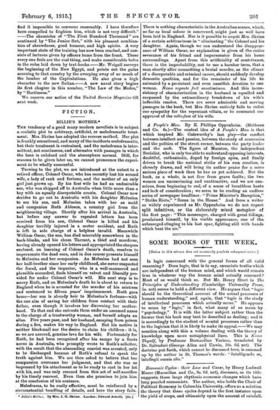SOME BOOKS OF THE WEEK.
[Igolics in this column does not uccmasily preduat subsequent review.] Is logic concerned with the general forms of all valid reasoning? Does logic, that is to say, enunciate truths which are independent of the human mind, and which would remain true in whatever way the human mind actually reasoned ? Most of us would think so. But Mr. Henry Start in The Principles of Understanding (Cambridge University Prom, 5s. net) seems to hold a different view. He argues that "logic should be the theoretical account of the actual processes of human understanding," and, again, that "logic is the study of intellectual processes which actually occur." He appears to mean by "logic," in fact, what many of us mean by "psychology." It is with the latter subject rather than the former that his book may best be described as dealing; and it is accordingly to the student of mental processes rather than to the logician that it is likely to make its appeal.—We may mention along with this a volume dealing with the theory of knowledge upon more metaphysical lines. This is Know Thyself, by Professor Bernardino Valise°, translated by Dr. Salvadori (George Allen and Unwin, 10s. 6d. net). The doctrine put forth, which cannot be discussed hem, is summed up by the author in St. Thomas's words: "Intelligendo se, intellegit omnia alia."






































 Previous page
Previous page